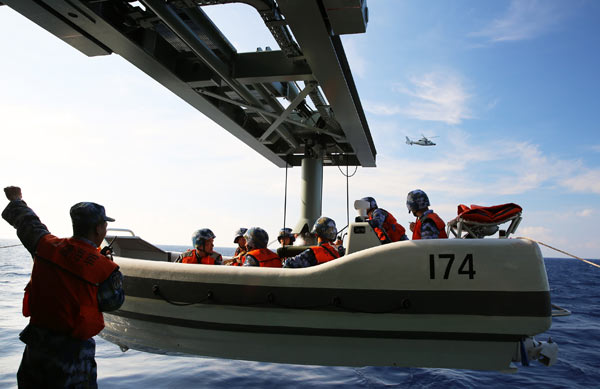
Troops of the South China Sea Fleet of the People's Liberation Army Navy conduct a drill on waters off the Xisha Islands on Thursday. Li Youtao / China News Service
The South China Sea arbitration case brought by the Philippines is nothing but a ruse in the guise of law, and China will neither accept nor acknowledge the forthcoming ruling, said Ouyang Yujing, head of the Foreign Ministry's Department of Boundary and Ocean Affairs.
He said on Friday the arbitration case is ultimately about sovereignty and disputes over maritime delimitation, and the Philippines filed the case to try to distort the fact that it has illegally occupied China's territory.
The issue of sovereignty doesn't fall under the auspices of the United Nations Convention on the Law of the Sea, he said.
China, in accordance with the convention, has declared that it doesn't accept compulsory dispute settlement procedures concerning maritime delimitation.
"The international tribunal has no jurisdiction over this case," Ouyang said. "Once it makes a ruling, it will be an act of ... abusing its power."
Foreign Ministry spokesman Hong Lei made similar comments on Friday, saying that any expectations of forcing China to concede through arbitration are a "fantasy".
Fu Kuncheng, dean of the South China Sea Institute of Xiamen University, said the Philippines' move "will turn a good mechanism of solving disputes into one that creates disputes".
He said territorial disputes will get further complicated through compulsory legal procedures.
Ouyang reiterated that three international treaties — signed in 1898, 1900 and 1930 — have made it clear that the territory of the Philippines lies east of 118 degrees longitude, while China's Nansha Islands and Huangyan Island lie west of the longitude.
In the 1970s, the Philippines began to expand its territory west of the longitudinal line, and it has illegally occupied eight islands and reefs of China's Nansha Islands, according to Ouyang.
Hong rejected accusations that China's reclamation work has damaged the coral reef in the South China Sea.
"As the owner of Nansha Islands, China cares about protecting the ecological environment of relevant islands, reefs and waters more than any other countries, institutions or individuals," said Hong.
He said China is determined to protect the maritime environment during the construction work on the islands and has insisted on a green approach.
He added that China's capacity to protect the ecological environment of the area will be greatly improved after construction is completed.


















































